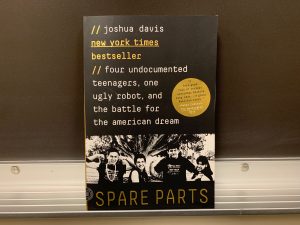
Common reader program hosts discussion on the nature of immigration
The Common Reader Program, directed by Lecturer of Humanities Anne Gessler, is a University of Houston-Clear Lake program that began in fall 2014 with the objective of cultivating critical thinking, reasoning and analysis of the student body.
On Friday, Nov. 1. the program hosted a workshop for the analysis of this year’s common reader book, “Spare Parts: Four Undocumented Teenagers, One Ugly Robot, and the Battle for the American Dream” by Joshua Davis.
“Spare Parts” depicts the journey of four undocumented Mexican-American immigrant students’ endeavors in the area of college robotics competitions.
The book touches upon the struggles and hardships that a person under an immigration status might have in the United States. The event developed into a discussion with regard to the current nature of immigration in the United States and the hardships that it presents to the student body.
Moderated by Gessler and a panel of peer mentors, a group of students that have already gone through the Common Reader Program and are now working as guides and assistants to the staff in an effort to effectively “take risks, reach out for support services, build new skills, explore new ideas, and forge new identities” as defined on the program’s webpage.
The peer mentors that worked as moderators and guides for the event were: Jennifer Harmon, psychology major; Jacob Howard, civic engineering; Colin Brock, psychology major; and Cameron Dornhoufer, accounting major. Each one gave their own perspective on the realities and hardships of immigration in regard to both examples of the text and their own personal lives and experiences.
“If you are undocumented, you don’t have a home address because you don’t pay taxes, and if you don’t pay taxes you cannot get a license, [and] if you cannot get a license you cannot vote,” Howard said. “If you’re here and undocumented you are pretty much alone and by yourself.”
The discussions on the hardships of an immigrant’s life were not the only topic at hand. A fundamental part of the event was the examining of UHCL’s nature as a Hispanic-Serving Institution and what that entails to the university and the students that form its body.

The question of what UHCL is doing for its immigrant population was discussed by the panel.
“Having social workers on campus, and a myriad of resources that are open and available to not only the Hispanic population but to all its members,” Harmon said.
As Gessler points out, declaring oneself a specific name is a different thing from acting in accordance to what said name entails.
“What does it mean to be a Hispanic-enrolling institution and what does it mean to be a Hispanic-serving institution?” Gessler said. “What service and events does the university need to give to gain the Hispanic-Serving Institution?”
Christine Paul, director of the Foreign Language Program, brought forth the struggles and changes the institution has gone through in order to be more accommodating to its immigrant population in the past few years.
“Since 2015, we have a [Latino/a and Latin American Studies] minor, we have the SDEI office, that is the Students Diversity Engagement and Inclusion office, we have social workers, we often have trainings for the immigrant population” Gessler said.
As stated by Collin Brock this discussion’s relevance shines because it serves as a reminder that people need to be sensitive to issues that may not immediately involve them personally. By bringing forth the hardships and challenges that immigrants face in their lives is the best way to strive for an understanding.
In the words of Christine Paul, “by discussing the nature of this book we can strive to change the perception of people and strive for a better understanding.”
